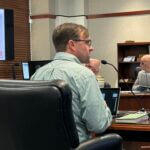Supervisors hear payment issue agreement, opt in to cannabis law
Recordkeeping issues meant thousands of dollars were paid for time not worked
DeSoto County supervisors heard Monday about a settlement between the Sheriff’s Department, Sheriff Bill Rasco, and State Auditor Shad White’s office about apparent salary overpayments to department employees. For as long as about 18 months, some employees were being paid salary for time not working . Recordkeeping inadequacies and the fact that much of this happened during the COVID-19 pandemic were likely a cause for the payment errors.
The item came up as an update from board attorney Tony Nowak about the Sheriff’s Department leave audit and that Rasco had submitted a check to the county. When Supervisor Mark Gardner asked about the check, County Administrator Vanessa Lynchard explained there was an issue with the department’s payroll and that some of the leave time related to COVID-19 and other administrative leave time got “off track.”
Lynchard said some leave was given in error or incorrectly classified. She did go on to say that all the issues were corrected. Rasco, according to the board minutes, had rectified the leave that could not be recovered by personally paying for it himself.
During the time that was investigated, instead of employee time being coded for vacation, sick time, or having the employee file for workman’s compensation and disability, a straight salary was being paid instead.
White’s office was brought in to investigate. As a settlement, some employees had sick time or vacation time taken back to make good on the overpayment. In the case of employees who either left to go elsewhere, efforts were made to recoup the extra payments, which returned about $100,000.
Still, about $19,000 was not recovered back to the county. As a result, Rasco paid the difference from his personal funds. As the elected official, Rasco is held responsible. The amount Rasco personally paid was $19,947.54 back to DeSoto County taxpayers.
By the county’s efforts to recover overpayments and the payment from Rasco’s personal account, the State Auditor’s office has told DeSoto County it considers the issue resolved. The settlement was reached with the Auditor’s office, the Auditor’s attorney, and DeSoto County.
It was noted in the minutes an email had been sent from Jim Bobo of the State Auditor’s office stating the issue has been resolved to their satisfaction.
Supervisors Monday also took action on another front. By not taking action, DeSoto County has officially opted into the new medical cannabis law in the state.
At a meeting on the issue last Monday morning, April 25, supervisors heard from board attorney Tony Nowak and from residents who supported the county being included under the new law by “opting in.”
Counties and municipalities were given the chance to “opt out” of the law but had until Monday, May 2 to do so. The opt out would allow those municipalities and counties to prohibit activities to grow, harvest or dispense medical cannabis in its jurisdiction.
Communities that had already opted out did so primarily because of zoning concerns. Horn Lake and Southaven were two of the cities that opted out of medical cannabis, both saying they wanted to investigate zoning before declaring themselves back in.
At the April 25 meeting, county supervisors took no action but adjourned the meeting until Monday, May 2. Some initially interpreted that to mean the county was opting in at that time, because the discussion appeared to favor the county staying in.
However, since the board had its regular meeting scheduled for the deadline date, May 2, it left the door open for a change of mind if needed.
By not taking any action but instead forming a committee Monday to look further into zoning, the county officially opted into the law.
Supervisors Mark Gardner and Lee Caldwell, along with Planning Director Bennie Hopkins, are included in the committee that will look at how zoning for medical cannabis will look going forward.
Governing bodies last month were buoyed in their questions about zoning in an opinion from state Attorney General Lynn Fitch earlier in April that addressed local zoning control, with Fitch stating that cities and counties had more zoning control than they earlier thought they had.
Photo: DeSoto County Administration Building. (Bob Bakken/DeSoto County News)






